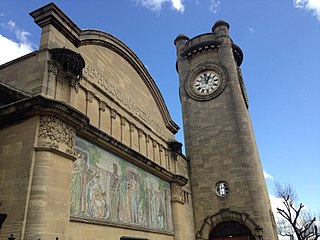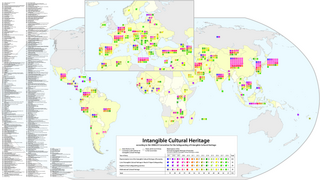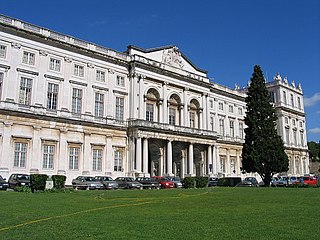Related Research Articles

The conservation and restoration of cultural property focuses on protection and care of cultural property, including artworks, architecture, archaeology, and museum collections. Conservation activities include preventive conservation, examination, documentation, research, treatment, and education. This field is closely allied with conservation science, curators and registrars.

The Department for Digital, Culture, Media and Sport (DCMS) is a department of His Majesty's Government, with responsibility for culture and sport in England, the building of a digital economy, and some aspects of the media throughout the UK, such as broadcasting and the Internet.

The Horniman Museum and Gardens is a museum in Forest Hill, London, England. Commissioned in 1898, it opened in 1901 and was designed by Charles Harrison Townsend in the Modern Style. It has displays of anthropology, natural history and musical instruments, and is known for its large collection of taxidermied animals. The building is Grade II* listed.
esea contemporary, formerly the Centre for Chinese Contemporary Art, is a contemporary art gallery based in Manchester, England. It is located on Thomas Street in Manchester's Northern Quarter in the renovated part of the Smithfield Market Hall.

Culture24, originally the 24 Hour Museum, is a British charity which publishes websites, Culture24, Museum Crush and Show Me, about visual culture and heritage in the United Kingdom, as well as supplying data and support services to other cultural websites including Engaging Places.

Cultural heritage is the heritage of tangible and intangible heritage assets of a group or society that is inherited from past generations. Not all heritages of past generations are "heritage"; rather, heritage is a product of selection by society.

The Agency for Cultural Affairs is a special body of the Japanese Ministry of Education, Culture, Sports, Science and Technology (MEXT). It was set up in 1968 to promote Japanese arts and culture.

The Nautical Archaeology Society (NAS) is a charity registered in England and Wales and in Scotland and is a company limited by guarantee.

Repatriation is the return of the cultural property, often referring to ancient or looted art, to their country of origin or former owners. The disputed cultural property items are physical artifacts of a group or society taken by another group, usually in the act of looting, whether in the context of imperialism, colonialism, or war. The contested objects vary widely and include sculptures, paintings, monuments, objects such as tools or weapons for purposes of anthropological study, and human remains.

Sharjah is the third-most populous city in the United Arab Emirates, after Dubai and Abu Dhabi, forming part of the Dubai-Sharjah-Ajman metropolitan area.

UNESCO established its Lists of Intangible Cultural Heritage with the aim of ensuring better protection of important intangible cultural heritages worldwide and the awareness of their significance. This list is published by the Intergovernmental Committee for the Safeguarding of Intangible Cultural Heritage, the members of which are elected by State Parties meeting in a General Assembly. Through a compendium of the different oral and intangible treasures of humankind worldwide, the programme aims to draw attention to the importance of safeguarding intangible heritage, which UNESCO has identified as an essential component and as a repository of cultural diversity and of creative expression.

The Khalili Foundation is a UK-based charity promoting interfaith and intercultural understanding through art, culture and education. Its founder and chairman is the London-based philanthropist, art collector and scholar Sir David Khalili. A Persian Jew who grew up in Iran, he is notable for having the world's largest private collection of Islamic art. Established in 1995, the foundation has created interfaith and intercultural links through "cultural, academic, sporting and educational programmes".

The Little Museum of Dublin is a local history museum situated at St Stephen's Green, Dublin, Ireland. The museum is located in an 18th-century Georgian townhouse owned by Dublin City Council.

Neil Francis Jeremy Mendoza, Baron Mendoza, is a British businessman, academic administrator, and member of the House of Lords.

Qatar Museums is a Qatari government entity that oversees the Museum of Islamic Art (MIA), Mathaf: Arab Museum of Modern Art, MIA Park, QM Gallery at the Katara Cultural Village, ALRIWAQ DOHA Exhibition Space, the Al Zubarah World Heritage Site Visitor Centre, and archaeological projects throughout Qatar, as well as the development of future projects and museums that will highlight its collections across multiple areas of activity including Orientalist art, photography, sports, children's education, and wildlife conservation.

The Iran Heritage Foundation (IHF) is a United Kingdom–registered charity was founded in 1995 in London. The mission is to promote and preserve the history, languages and cultures of Iran and the Persianate world, covering all periods of Iranian civilization from ancient to modern.

Disaster preparedness in museums, galleries, libraries, archives and private collections, involves any actions taken to plan for, prevent, respond or recover from natural disasters and other events that can cause damage or loss to cultural property. 'Disasters' in this context may include large-scale natural events such as earthquakes, flooding or bushfire, as well as human-caused events such as theft and vandalism. Increasingly, anthropogenic climate change is a factor in cultural heritage disaster planning, due to rising sea levels, changes in rainfall patterns, warming average temperatures, and more frequent extreme weather events.

The Direção-Geral do Património Cultural (DGPC), formerly the Instituto de Gestão do Património Arquitectónico e Arqueológico (IGESPAR) and Instituto Português do Património Arquitetónico (IPPAR, is a general directorate of the Government of Portugal tasked with the conservation, preservation, and inventory of Portuguese architectural heritage. This includes buildings and sites of historical, architectural, scientific or artistic value. The institute keeps a registry of all the classified sites and issues legally binding opinions regarding any works on them.

Russia began an invasion of Ukraine on 24 February 2022, in a major escalation of the Russo-Ukrainian War that began in 2014. It is the largest military attack in Europe since World War II. During the fighting, many pieces of Ukrainian cultural heritage were either destroyed, damaged, or put at risk due to the widespread destruction across the country. This deliberate destruction and looting of over 500 Ukrainian cultural heritage sites is considered a war crime and has been described by Ukraine's Minister of Culture as cultural genocide.
References
- ↑ "What We Do". Culture&. Retrieved 2 June 2022.
- ↑ "Cultural Co-operation, registered charity no. 801111". Charity Commission for England and Wales.
- ↑ "Two 'inspired appointments' to Culture& Board aim to strengthen museums sector ties". Museums + Heritage Advisor. 19 March 2021. Retrieved 2 June 2022.